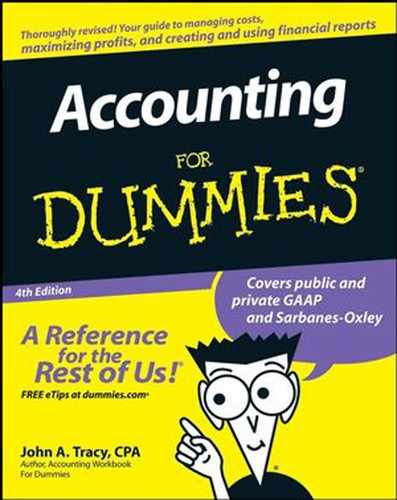3.6. Using Accounting Software
It would be possible, though not very likely, that a very small business would keep its books the old-fashioned way — record all transactions and do all the other steps of the bookkeeping cycle with pen and paper and by making handwritten entries. However, even a small business has a relatively large number of transactions that have to be recorded in journals and accounts, to say nothing about the end-of-period steps in the bookkeeping cycle (refer to Figure 3-1).
When mainframe computers were introduced in the 1950s and 1960s, one of their very first uses was for accounting chores. However, only large businesses could afford these electronic behemoths. Smaller businesses didn't use computers for their accounting until some years after personal computers came along in the 1980s. But, as the saying goes, "We've come a long way, baby." A bewildering array of accounting computer software packages is available today.
|
If I were giving a talk to owners/managers of small to middle-size businesses, I would offer the following words of wisdom about accounting software:
Choose your accounting software very carefully. It's very hard to pull up stakes and switch to another software package. Changing even just one module in your accounting software can be difficult.
In evaluating accounting software, you and your accountant should consider three main factors: ease of use; whether it has the particular features and functionality you need; and the likelihood that the vendor will continue in business and be around to update and make improvements in the software.
In real estate, the prime concern is "location, location, location." The watchwords in accounting software are "security, security, security." You need very tight controls over all aspects of using the accounting software and who is authorized to make changes in any of the modules of the accounting software.
Although accounting software offers the opportunity to exploit your accounting information (mine the data), you have to know exactly what to look for. The software does not do this automatically. You have to ask for the exact type of information you want and insist that it be pulled out of the accounting data.
Even when using advanced, sophisticated accounting software, a business has to design the specialized reports it needs for its various managers and make sure that these reports are generated correctly from the accounting database.
Never forget the "garbage in, garbage out" rule. Data entry errors can be a serious problem in computer-based accounting systems. You can minimize these input errors, but it is next to impossible to eliminate them altogether. Even barcode readers make mistakes, and the barcode tags themselves may have been tampered with. Strong internal controls for the verification of data entry are extremely important.
Make sure your accounting software leaves very good audit trails, which you need for management control, for your CPA when auditing your financial statements, and for the IRS when it decides to audit your income tax returns. The lack of good audit trails looks very suspicious to the IRS.
Online accounting systems that permit remote input and access over the Internet or a local area network with multiple users present special security problems. Think twice before putting your accounting system online.
Smaller businesses, and even many medium-size businesses, don't have the budget to hire full-time information system and information technology specialists. They use consultants to help them select accounting software packages, install software, and get it up and running. Like other computer software, accounting programs are frequently revised and updated. A consultant can help keep a business's accounting software up-to-date, correct flaws and security weaknesses in the program, and take advantage of its latest features.

